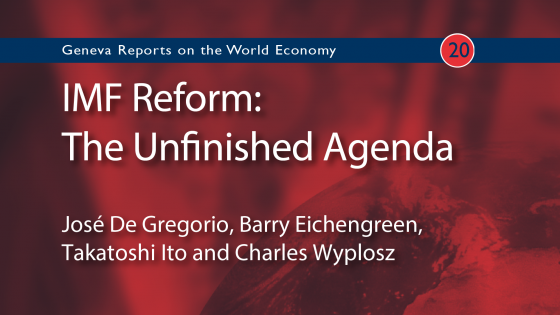The second meeting of the G20 has to grapple, once again, with the need for a reform of the institutional landscape for international cooperation in economic and financial issues. In part, this is the result of the fact that in an ongoing crisis, pressures to address immediate concerns of crisis management abound and medium- to long-term issues take a back seat. At the same time, however, there is a more fundamental problem. While being more representative than the G7, the G20 does not explicitly include an institution through which the multilateral perspective is brought to the table. The G20 thus shares at least one of the deficiencies of the system that it is expected to improve – a lack of impartial input into the discussion of global economic policy problems. The IMF provides much needed input for the discussions in the G20, but it does so effectively under the orders of the same governments that sit also in the G20.
The need for a bolder reform of global governance
The IMF in principle has the mandate to act as a watchdog over its member countries. However, when it comes to problems in large member countries, the IMF is severely limited in what it can achieve. For example, over the last 7 years the US refused to submit to a financial sector assessment program (FSAP). Partly as a consequence of large countries’ influence, those within the IMF that had warned of the emergence of substantial vulnerabilities through financial innovation relatively early did not have the means to follow-up on their risk assessment (Rajan 2005).
The degree to which the IMF was considered an institution which should focus on emerging markets became clear in the last two years, when the IMF underwent a large scale reduction in staff because its key shareholders thought that fewer crises in the past meant that the institution was no longer needed
This, at least, has now changed radically. There is now a general agreement that the global monetary system needs a body that looks after its overall systemic stability. And most experts would agree that the IMF is the right platform around which to build a structure of more effective policy coordination.
While much has to be done to improve its expertise in linking different aspects of global financial and economic fragility, the IMF is the only institution that has most of the basic building blocks. It knows bilateral surveillance and has multilateral units to combine insights from individual member countries. Similarly, it has a staff with expertise in monetary, financial, regulatory, real economy, and fiscal issues, and a lot of experience in emerging markets, and thus the regions that are likely to increasingly define global economic fragilities. Finally, the Fund’s global membership enables it to identify inter-regional links between national imbalances and risks and to incorporate the views of those economies that for the foreseeable future will not be at the center of the multilateral policy dialogue.
Increasing IMF independence
Increasing early warning capacities alone will not change anything if identified risks remain within the confines of the IMF. Greater independence of Fund surveillance is needed to ensure that national interests and veto rights do not prevent the actions that would follow from a thorough analysis of global vulnerabilities. Though we support many of the detailed prescriptions with respect to improving Fund governance (such as a single seat for the European Union, a transparent mechanism for choosing the Managing Director, and less micro management by the Executive Board) we believe that existing proposals fail to make an important distinction.
Differeniate voting procedures for lending and analytic functions
Specifically, we think that one cannot and should not create the same decision-making procedures for traditional IMF balance-of-payment support on the one hand and surveillance and early-warning activities on the other. The IMF is supposed to fulfil a range of activities, and for some of these a different mode of governance is entirely appropriate.
Granting balance of payments support has important fiscal implications and it is natural that for this function there should be continuing close oversight by those who provide in the end the capital, namely the fiscal authorities of the Fund’s member states.
Overseeing the global financial system, including the assessment global macro imbalances are analytical functions for which there is no need for close oversight. On the contrary, in the exercise of these functions independence and professional expertise should be decisive.
The decision rule of the Fund should thus distinguish between financial measures (granting balance of payments assistance) and the analytical function of the IMF, especially macro surveillance and potentially as the main organisation to look after sources of risk in the global financial system.
Reduce Executive Board interference
At present the daily business of the IMF is run by its Executive Board consists only of representatives of member countries and makes decisions that are all weighted by the shares of each member country. The IMF's 24-member Executive Board discusses everything from the IMF staff's annual health checks of member countries' economies to economic policy issues germane to the global economy.1 The IMF’s Executive Board is deeply involved in the day to day business of the IMF, meets almost permanently and constitutes essentially a very large extended Management Board, which delegates only the execution of its decision to the Managing Director and the staff.
This needs to change in order to give the IMF the independence it needs to become a credible impartial judge of balance of payments disequilibria and sources of risk to global financial markets. The IMF staff needs to be independent in these functions which should no longer be micro-managed by the Executive Board.
The required independence of the IMF staff can be achieved simply by stipulating that the Board of the IMF only oversees the work of the IMF on its analytical functions and, even more importantly that its decision making mode (and composition) is different in its oversight of these areas. This could be achieved with two simply decisions:
- The Executive Board should be enlarged by a number (possibly 3) of independent directors (as in the private sector) and the voting principle should be one man one vote. The independents board members would constitute only a small minority But their presence and professional expertise would give them a disproportionate weight and they would have a disciplining effect since they are to represent the general interest and would be free to go public with their views.
- Management would also be free to take positions on all issues not involving the use of fund resources unless it is explicitly overruled by the expanded board. This would give management de facto considerable independent since under the one man one vote principle the larger member countries could no longer block issues just because they are inconvenient from a domestic political point of view.
For all decisions involving the resources of the Fund (lending to member countries or the size of quotas, etc.) the existing decision making procedure could remain unchanged. All financial issues decisions would thus continue to be taken by the existing Executive Board with weighted voting reflecting the financial contribution of member countries to the IMF.
The ECB (or rather the Eurosystem as it likes to call itself) provides an interesting analogy because it has two voting procedures depending on the issue at hand:2 The Governing Council of the ECB comprises the six members of the Executive Board plus the governors/presidents of the national central banks of the countries in the euro area (at present 16). The Governing Council takes the really important decisions on monetary policy based on the ‘one man, one vote’ principle. When the Maastricht Treaty was negotiated this was considered an important concession by the Germans, but it is really indispensable if the ECB is to be really independent and if one expects that all members of the Governing Board, including particularly the governors of national central banks, base their decisions only on the interests of the entire euro area (and not of their home country). However, on financial matters (in particular the distribution of profits and losses) the voting rules are different: the Executive Board does not participate and the votes of the national central bank presidents in the Governing Council are weighted by their respective capital shares (Article 10.3 of the Statutes of the ECB).
Conclusion
It is by now generally acknowledged that there is need for an institution that looks after global financial macroeconomic stability. It is also generally agree that the IMF should play this role (in addition to its standard role of lender of last resort for countries with balance of payments difficulties). However, the IMF, as presently organised cannot fulfil this analytical function because it operates under the close scrutiny of a resident Board which represents the interests of individual member countries. We argue that the IMF can become an effective watch dog for international financial stability only if its governance is changed. The management and staff of the IMF needs to have a high degree of independence in order to be able to criticise, if needed, even its largest member states. This can be achieved by putting independent directors on the Board and changing its voting arrangements.
Note: This column is a condensed version of material originally published in the March/April 2009 issue of Intereconomics.
References
Rajan, Raghuram (2005), “Has financial development made the world riskier?” NBER Working Paper No. W11728.
Addendum: Proposed changes to the IMF’s Statutes (Articles of a Agreement)
Section 3. Governing (instead of Executive) Board
(a) The Governing Board shall be responsible for supervising (instead of conducting) the business of the Fund, and for this purpose shall exercise all the powers delegated to it by the Board of Governors.
New paragraph:
Section 3.xx The Governing Board
The Governing Board shall consist of the Executive Board, the Managing Director, two Deputy Managing Directors and three independent members selected for their professional expertise in international financial matters. Each member of the Governing Board has one vote. The Managing Director shall be chairman of the Executive Board and shall have the casting vote in case of an equal division. In matters involving the use of the financial resources of the IMF only the members of the Executive Board shall vote and their votes shall be weighted by the shares of the constituencies they represent.
Section 4. Managing Director and staff
(a) The Board of Governors (instead of Executive Board) shall select a Managing Director (and two deputy MDs) who shall not be a Governor or an Executive Director. The Managing Director shall be chairman of the Executive Board, but shall have no vote except a deciding vote in case of an equal division. He may participate in meetings of the Board of Governors, but shall not vote at such meetings. The Managing Director shall cease to hold office when the Executive Board so decides.
(b) The Managing Director shall be chief of the operating staff of the Fund and shall conduct, under the direction of the Executive Board, the ordinary business of the Fund. Subject to the general control of the Governing Board, he shall be responsible for the organisation, appointment, and dismissal of the staff of the Fund.
1 See www.imf.org
2 The ECB has also two decision making bodies, but the second one, the General Council, which comprises also the governors of the central banks of the EU countries which do not (yet) participate in the euro area, has no important function.



